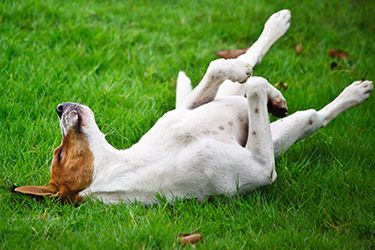Veterinarian Tips: Hot Spots

It often starts with an itch! An irritation that has to be nibbled at and licked until, before you know it, that itchy spot has turned into an oozing, red, painful patch of bare skin. Quick to develop, hot spots are a nuisance!
When your clients call or come to your office with a pet suffering from a hot spot, provide them with this helpful information:
Acute Moist Dermatitis, commonly referred to as a hot spot, is a localized skin infection that can occur anywhere on the body and often in more than one area. While warm and humid weather seems to be the catalyst, hot spots can appear whenever an animal constantly licks and chews at their skin.
Causes of Hot Spots
The underlying cause of a hot spot can be anything that triggers an itch. If the itching turns into severe scratching and chewing, the resulting damage to the surface of the skin will prompt rapid bacterial growth. The more damage, the more bacteria, and the greater the itch. Further scratching helps to progressively worsen the hot spot, and the affected area will enlarge quickly.
Possible causes of hot spots, include:
- Skin parasites, such as fleas and mites
- Allergies, including food, contact, and airborne
- Insect bites or stings
- Ear infections
- Grooming problems, including hair that is matted or tangled or skin that is dirty
- Psychological issues, such as boredom, anxiety, or depression
- Medical conditions resulting in pain that causes the animal to lick and bite an area.
Hot spots can be found on any dog or cat, but clients of Newfoundlands, Pyrenees, and Golden Retrievers need to know to watch for the signs that indicate a hot spot is forming. These dogs, along with others that have heavy and hairy ears, plus animals with thick coats and long hair, seem to be the most susceptible.
Symptoms of Hot Spots
Hot spots are very painful, and may cause the animal to be easily irritated or lash out uncharacteristically.
The signs of hot spots include:
- Intense itching
- Sudden onset of a warm, painful and swollen patch of skin that enlarges quickly
- Lesion that exudes pus and has a foul smell
- Rapid loss of hair in the area of the lesion.
Treatment of Acute Moist Dermatitis
The steps to treat an animal with a hot spot typically involve the following:
- Clip any hair that is over the hot spot. Trimming the hair back will let air reach the area to dry it out and also expose the entire surface area of the hot spot lesion
- Clean the lesion with a mild antiseptic wash, such as Betadine or Nolvasan. Washing with a mild antiseptic will help to clear the infection from the lesion by removing any surface bacteria and discharge
- Allow the skin to dry thoroughly
- Apply a topical antibiotic/anti-inflammatory ointment, such as an antibiotic steroid cream or powder. Antibiotics will reach the infection in the deeper skin layers.The anti-inflammatory most often prescribed is cortisone, which reduces the itching and discomfort, and stops the animal from scratching and causing further damage to its skin
- If the animal continues to traumatize the area, the veterinarian may prescribe an Elizabethan collar or a BiteNot collar.
Clients need to be advised that because hot spots are very painful, it may be required to sedate or anesthetize the animal for treatment. A general anesthetic given during the course of the entire procedure will be less traumatic for the animal.
Prevention
The following information may help clients keep their animal from experiencing the discomfort of hot spots:
- When the weather is hot and humid, thoroughly dry the coat of an animal after they have had a bath or have been swimming
- Good grooming practices should be followed. For example:
- Comb and brush coat regularly to remove tangles, prevent matting, and get rid of any foreign debris that may cause an irritation to the skin
- Bathe animal when dirty
- Use flea and tick control preventives regularly
- Routinely wash bedding
- Deter animal from licking.
Summer weather offers the perfect conditions for an animal to develop a hot spot. Warn clients to be on the lookout for the start of any itching!
Your Covetrus representative can provide other tips and suggestions of value to you and your clients! Contact us at: 855.724.3461 or online.
Sources
http://www.akc.org/content/health/articles/treating-and-preventing-hot-spots-on-dogs/
http://www.wideopenpets.com/3-common-skin-parasites-dogs-cats/
Need Regulatory Assistance
If you need help with regulatory or licensing issues, we're happy to help. We have a wide variety of resources to help you when issues arise.

Careers
Are you looking for a place to let your talents shine? At Covetrus, we help our practitioner customers better serve their patients and take pride in providing the best customer experience possible. Search our open positions to see our available opportunities.
Newsletter
Stay current with what’s going on with Covetrus, subscribe to receive our newsletter and email communications. Subscribers will receive the latest information in practice management, sales and marketing, animal health, and more.


Leave a comment